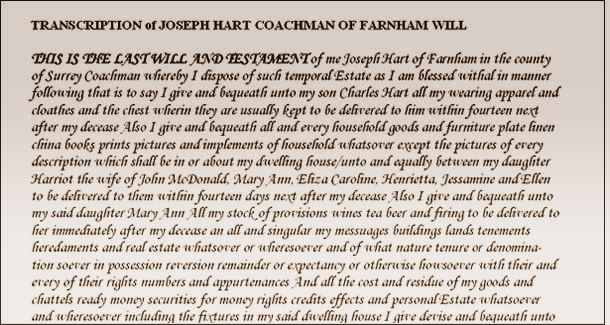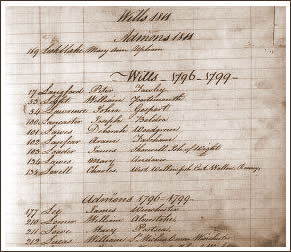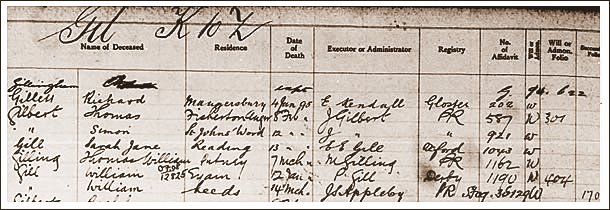Record Offices Guide - Sample Page
Contents
What do you find in a will?
- The name of the testator (the person making the will)
- His address, and usually his occupation
- The date the will was written
- Bequests which may be to family, friends, neighbours or charities
- The executors, people trusted to carry out his wishes
- The testator’s signature
- Signatures of at least two witnesses (who must not benefit from the will.)
- The date probate was granted (ie the document was agreed to be the testator’s last will and testament), and to whom.
- Where the testator wants to alter a provision or change a beneficiary. a codicil will note these changes and be filed with the will.
Why is the information useful?
Wills may mention dead ancestors, pregnant wives, married daughters, grandchildren.... You cannot tell how much detail a will may contain until you’ve read it. A will may be the only document to link branches of the family living in different counties, particularly after 1901.
You have a snapshot of circumstances when the will was made, not when the testator died.
How to look for a death.
Before 1837 and after about 1912, it may be quicker to search a will index, as death will have occurred between the dates of will and probate. Though be warned that some wills are proved long after death in one case 76 years later.
Probate may show that the original executor has died, or is unwilling to act, and explain why someone else takes their place.
What a will does not tell you is someone’s full fortune. Land is generally not mentioned in wills.
Conversely, some people's wills totalled more than their assets!
Boys may have been put to a trade or had a farm bought for them; girls may have had a marriage settlement made on them. Where a child has already been given their share, they may not be mentioned in a will.
If you are looking at an original will, then you can see your ancestor’s actual signature or mark. If it is a registered copy (like the PCC wills you can download from Documents Online) then the signatures will be copies.
Partial transcription of the Will of Joseph Hart Coachman
When was the will proved?
Before 1858
Wills were proved in church courts. There are usually at least three courts where you might find an individual's will:
- The local Archdeaconry court
- The local Consistory or Commissary court
- The PCC - the Perogative Court of Canterbury where wills might be proved for anyone living in England or Wales.
If you don't find a will, it is also worth looking for an Administration
1858 onwards
Copies of all wills are held by the Principal Probate Registry.
A few Record Offices will have indexes, usually on film or fiche, but these will not be right up to the present. The indexes are worth consulting, simply because of the detailed information they contain on both testators and executors.
Images from Documents Online and subject to ©Crown Copyright
Back to Taster Page




